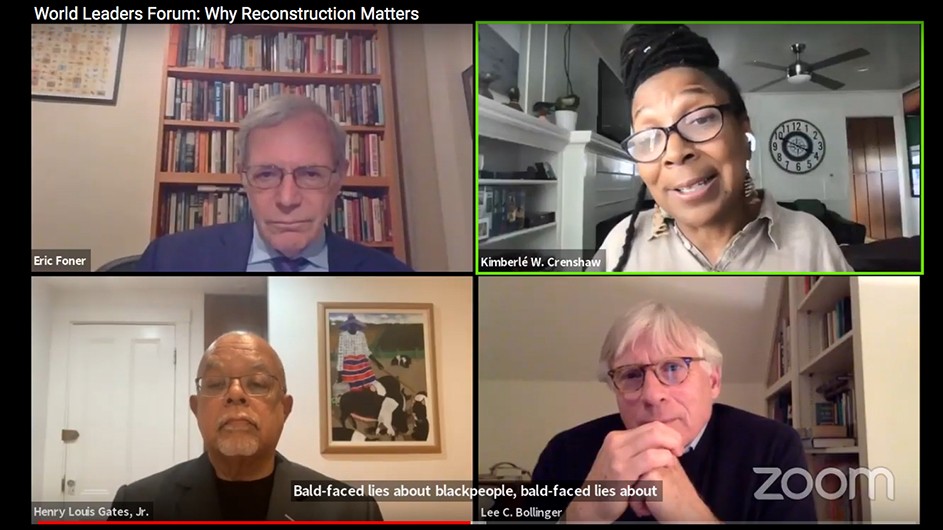Reflecting on the History and Legacies of Reconstruction
President Bollinger moderates an online panel with Kimberlé W. Crenshaw, Eric Foner, and Henry Louis Gates, Jr. that focuses on how the post-Civil War period connects to contemporary U.S. politics.

On October 20, 2020, leading scholars examined the intersections of 19th-century history with contemporary politics, and offered visions for America’s future, during “Why Reconstruction Matters.” The online event was moderated by Columbia President Lee C. Bollinger and introduced by Vice Provost and University Librarian Ann Thornton. Nearly 700 people viewed the panel, which was cosponsored by the World Leaders Forum and Columbia Libraries.
The panelists—Kimberlé W. Crenshaw, professor at Columbia Law School, Eric Foner, emeritus professor of history, and Henry Louis Gates, Jr., filmmaker and Harvard professor—have each written extensively about the period of Reconstruction, and were all featured in a recent PBS documentary series on the topic.
The Abolition of Slavery, the Rise of Jim Crow
Occurring during the decade following the Civil War, Reconstruction saw the legal abolition of slavery, the establishment of equal protection under the law, and increased opportunities for Black men to vote and hold political office. But reaction by white supremacists came swiftly, and the era closed in 1877 with lynching and anti-Black riots, voter disenfranchisement, and the rise of Jim Crow. “Reconstruction in a nutshell was twelve years of Black freedom followed by an alt-right rollback,” Gates said during the panel. “Does that sound familiar?”
The disputed results of the 1876 presidential election helped speed the demise of Reconstruction. With just days remaining before another uncertain presidential election, voting rights and national politics were a focus of the conversation. “If you ask me what I want students, teachers, and the general audience to take away, there’d be two things,” said Gates: “The power of voter suppression, and the fact that the achievement of rights thought permanent can be overturned. Our rights can never be taken for granted, which is why we have to vote, we have to vote, we have to vote.”
The Propaganda of History
For decades, the legacy of Reconstruction was intentionally twisted and defaced by academics, writers, filmmakers, and politicians. Columbia professors, including historian William A. Dunning and political scientist John W. Burgess, popularized white-supremacist lies about the era that would inspire such racist works as the film Birth of a Nation, which was screened in the White House by President Woodrow Wilson in 1915.
These lies told about Black participation in politics, which scholar W.E.B. Du Bois referred to as “The Propaganda of History” in his seminal 1935 study, Black Reconstruction in America, also resonate with today’s political moment. “To think that we’re in a new place,” said Crenshaw, “where facts have no meaning, where evil can say anything, where what people believe is more important than what is – that’s not new. That’s what happened in Reconstruction. Bald-faced lies about Black people, bald-faced lies about Reconstruction governments … these lies actually became the grounding for actual disenfranchisement, segregating the federal government, for increased racial violence.”
A Triumph of African American Achievement
Eric Foner is among those historians most responsible for reviving interest in Reconstruction, and recasting the period as a triumph of African American achievement. His latest book on the era, The Second Founding: How the Civil War and Reconstruction Remade the Constitution, focuses in particular on constitutional law. During the discussion, he suggested legal reforms that could help reinvigorate the U.S. election system.
“The first thing I would like to see done,” said Foner, “is a national law establishing the right to vote for all citizens eighteen years old and over, overriding all these local voter suppression efforts. Would the current Supreme Court uphold such a law? I don’t know, but I think they have to be forced to confront it. This would put us in the same league as many other modern countries, where every adult has the right to vote, and there’s no question about that. We have not yet reached that level.”
At several moments during the event, the panelists shared their feelings of stress over the state of national politics, and concern about the future of U.S. democracy. For Crenshaw, those feelings prompted a sense of connection with the people who lived through Reconstruction.
“I often wonder how Black people felt in 1873,” she said. “Did they see what was coming? Did they have any idea that the likelihood that things would get significantly worse rather than better was just around the corner? And if they had known, what would they have done? This is the question that I think our society should be asking now. We know what’s possible. Now that we know what’s possible, how does that put us in the position to throw everything we got at this moment.”
The event can be viewed here: https://worldleaders.columbia.edu/content/why-reconstruction-matters
Thai Jones is a lecturer in the history department and the Lehman Curator for American History at the Rare Book and Manuscript Library